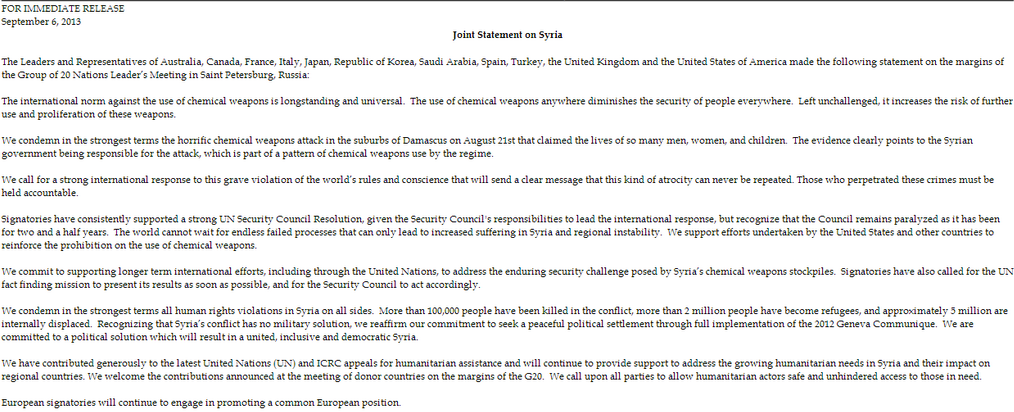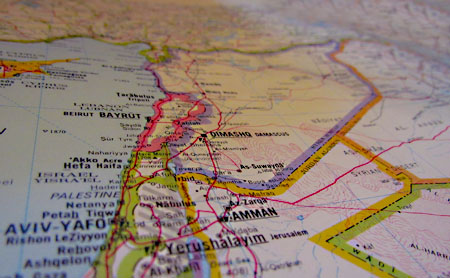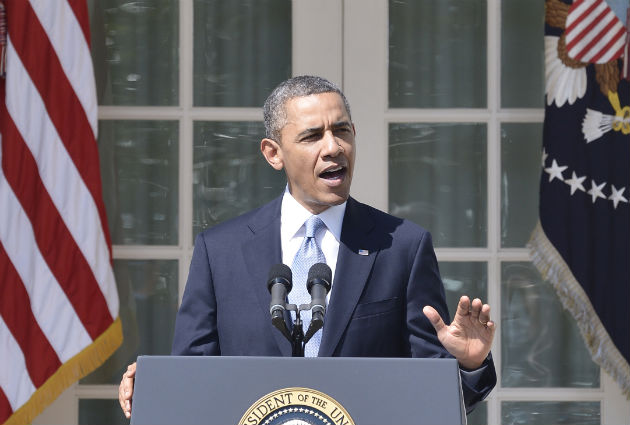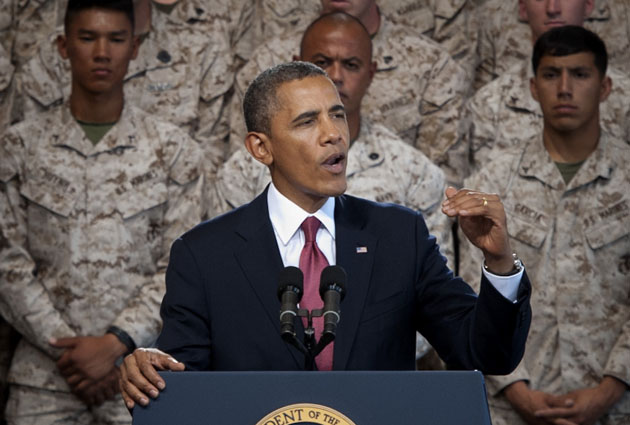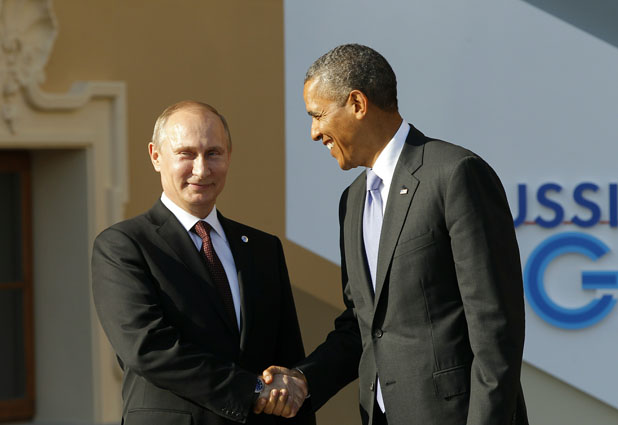
Aleksander Nikolaev/Russian Look/Zuma
When President Barack Obama announced that he would seek congressional authorization for a limited military strike against the Syrian regime in retaliation for its presumed use of chemical weapons, he turned the ongoing op-ed tussle over Syria into an official debate. Since the August 21 chemical weapons attack outside Damascus, foreign policy experts, columnists, cable news commentators, bloggers, and others have been arguing over what to do about Syria, and it was hard to know how much any of this policy wonk combat mattered because the decision appeared to rest with one man, the commander in chief. But with Obama recognizing Congress’ role in war-related decision-making, the ensuing debate in the House and Senate—and the external, surrounding debate that could well affect congressional deliberations—will shape how the United States responds to events in Syria.
Below is our running guide to the Syria debate raging on and off Capitol Hill. As Congress moves toward a vote, we will track commentary within Congress and within the commentariat, and gather it in one handy place. (To jump to the latest updates, click here.)
Helping Syria could destroy it. The day before Obama gave his Rose Garden statement calling for a congressional vote—and declaring the United States needed to hit Bashar al-Assad’s regime to deter it and others from using chemical weapons—Steven Cook, a senior fellow for Middle Eastern studies at the Council on Foreign Relations, published a piece in the Washington Post on Friday contending that an assault on Syria would do far more damage than good. Cook, who previously had recognized a case for intervention, wrote:
The formidable U.S. armed forces could certainly damage Assad’s considerably less potent military. But in an astonishing irony that only the conflict in Syria could produce, American and allied cruise missiles would be degrading the capability of the regime’s military units to the benefit of the al-Qaeda-linked militants fighting Assad—the same militants whom U.S. drones are attacking regularly in places such as Yemen. Military strikes would also complicate Washington’s longer-term desire to bring stability to a country that borders Lebanon, Turkey, Iraq, Jordan and Israel. Unlike Yugoslavia, which ripped itself apart in the 1990s, Syria has no obvious successor states, meaning there would be violence and instability in the heart of the Middle East for many years to come.
“It is on occasions like this that I am grateful that I am no longer a White House aide.” Gary Sick, who served on the National Security Council during the Ford, Carter, and Reagan administrations, wrote this on his Tumblr on Saturday. He presents the White House’s conundrum as such:
Imagine that you are a White House adviser and you have been asked to calibrate a military intervention that will send an unmistakeable message to Assad that his use of CW was a serious error and persuade him that any such action in the future would be unacceptably costly to Syria generally and to the Assad government in particular.
However, the attack should not change the fundamental balance of power in the civil war — specifically it should not empower the radical Sunni opposition forces that are potentially worse than Assad. The strike should not be so great that it inspires reckless behavior by other states or parties in the region — specifically it should not provoke retaliation, for example, by either Hezbollah or Syria against Israeli targets.
Read the rest here.
“Mishandled.” On Sunday, CNN’s Fareed Zakaria slammed the Obama administration for its handling of the crisis. “Whatever your views on the larger issues, it’s hard not to conclude that the administration’s handling of Syria over the last year has been a case study in how not to do foreign policy,” Zakaria wrote, concluding: “I don’t think that this strike, should it eventually take place, will be as damaging as its critics fear. The al-Assad regime will likely hunker down, take it, and move on. It will make little difference one way or the other. But the manner in which the Obama administration has first created and then mismanaged this crisis will, alas, cast a long shadow on America’s role in the world.”
“Appealing in theory.” On Sunday, the International Crisis Group issued an official statement on Syria. Here’s an excerpt:
Carefully calibrating the strike to hurt enough to change their calculations but not enough to prompt retaliation or impede diplomacy is appealing in theory. In practice, it almost certainly is not feasible.
Whether or not the U.S. chooses to launch a military offensive, its responsibility should be to try to optimize chances of a diplomatic breakthrough. This requires a two-fold effort lacking to date: developing a realistic compromise political offer as well as genuinely reaching out to both Russia and Iran in a manner capable of eliciting their interest—rather than investing in a prolonged conflict that has a seemingly bottomless capacity to escalate.
Bomb no matter what. James Ceaser, professor of politics at the University of Virginia (who the Weekly Standard‘s William Kristol calls one of “American conservatism’s leading thinkers”), wrote a post for First Things on Sunday that forcefully calls for Republican lawmakers to support for air strikes, no matter their opinions of the Obama White House:
Republicans should support some version of the authorization of force resolution. They should do so even if they think that the President’s policy will prove ineffective, do no good, waste money, or entail unforeseen risks; they should do so even if they think he has gotten the nation into this situation by blunders, fecklessness, arrogance, or naiveté; and they should so even if, and especially, if they have no confidence in his judgment. The simple fact is that the nation and our allies will be at further risk if the world sees a presidency that is weakened and that has no credibility to act. Partisans may be tempted to see such a result as condign punishment for the President’s misjudgments; they may feel that he deserves to pay the price for his hypocrisy and cheap and demagogic attacks on his predecessor. But at the end of the day, Republicans need to rise above such temptations; the stakes are too high. The weaker the president’s credibility on the world scene, the more the need to swallow and do what will not weaken it further. President Obama is the only president we have. That remains the overriding fact.
Don’t lump all the rebels in with Al Qaeda. Sen. John McCain (R-Ariz.)—who has said that Congress voting against military intervention in Syria would be “catastrophic“—appeared on Fox News on Tuesday morning to discuss the crisis. During the interview, Fox & Friends cohost Brian Kilmeade played a clip of a Syrian rebel shouting “Allahu Akbar!” (which translates to “God is [the] greatest”) following a strike on Assad’s forces. Kilmeade highlighted this chant as evidence that extremist Islamist elements are infiltrating the Syrian opposition (a legitimate concern in itself): “I have a problem helping those people out if they’re screaming that after a hit,” he said. McCain responded:
Would you have a problem with an American Christian saying, “Thank God! Thank God!” That’s what they’re saying. C’mon! Of course they are Muslims—but they are moderates. And I guarantee it, that they are moderates. I know them, and I have been with them. For someone to say, “Allahu Akbar” is about as offensive as someone saying, “Thank God.”
(In May, when McCain visited Syrian rebel leadership, the senator was caught in an unfortunate photo op where one of the pictured rebels turned out to be involved with the kidnapping of eleven Lebanese Shiite pilgrims.)
Watch:
Boehner backs strikes. On Tuesday, House Speaker John Boehner (R-Ohio) announced his support for President Obama’s call for limited military intervention. “I am going to support the president’s call for action,” Boehner said. “The use of these weapons has to be responded to.”
The speaker made the comments following a meeting at the White House. Last week, Boehner sent a letter to the president urging him to “make the case to the American people and Congress for how potential military action will secure American national security interests, preserve America’s credibility, deter the future use of chemical weapons, and, critically, be a part of our broader policy and strategy.”
Iraq War hawks John Bolton comes out against bombing Syria. On Tuesday, Bolton, former ambassador to the United Nations during the Bush years (and well-known über-hawk), came out against a resolution authorizing a strike on Syria. “I think if I were a member of Congress, I would vote against an authorization to use force here,” Bolton said on Fox & Friends. “I don’t think it is in America’s interest. I don’t think we should in effect take sides in the Syrian conflict.”
Watch:
The United Nations, on Syria’s worsening refugee crisis.
2 million refugees. There is no end in sight. #Syria is hemorrhaging.
— UN Refugee Agency (@Refugees) September 3, 2013
On Tuesday, the UN Refugee Agency issued a press release on the 2 million Syrian refugees so far. An excerpt:
The number of two million represents Syrians who have registered as refugees or who are pending registration. As of end August this comprised 110,000 in Egypt, 168,000 in Iraq, 515,000 in Jordan, 716,000 in Lebanon, and 460,000 in Turkey. Some 52 per cent of this population are children aged 17 years or below. UNHCR announced only days ago, on 23 August, that the number of Syrian child refugees had exceeded a million…UNHCR is active in Syria and is leading the humanitarian response to the refugee crisis in each of the surrounding countries. Humanitarian agencies are worryingly underfunded, with only 47 per cent of funds required to meet basic refugee needs received.
Here’s an Instagram video the UN Refugee Agency tweeted out on Tuesday:
The man who coined “Axis of Evil” weighs in. On Tuesday, David Frum, former speechwriter for President George W. Bush, posed four questions to supporters of a Syria mission. They are:
1. What will it accomplish?
2. What comes next?
3. What will it cost?
4. Is there another way?
The Benghazi-Syria talking point gains traction. On Tuesday, after Boehner voiced his support for limited military intervention in Syria, Rep. Tim Huelskamp (R-KS) tweeted the following:
Since #Obama still refuses to tell us the whole truth about #Benghazi, why do GOP leaders trust Obama to be truthful about #Syria? #TCOT
— Cong. Tim Huelskamp (@CongHuelskamp) September 3, 2013
Former Republican congressman Allen West posted similar comments to Facebook over the weekend:
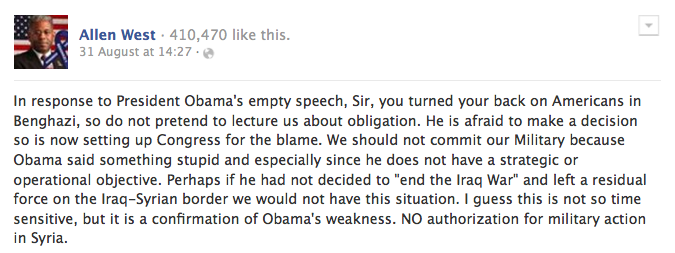
The website of Walid Shoebat—an author and converted ex-terrorist who’s made questionable statements regarding his jihadist past—had published similar sentiments earlier, in a post titled, “Benghazi is why Obama can’t be trusted on Syria.”
Hagel testifies. On Tuesday, the Senate Foreign Relations Committee held its first hearing on possible intervention. (The House and Senate are scheduled to vote on the use of military force next week.) Secretary of State John Kerry, Secretary of Defense Chuck Hagel, and Gen. Martin Dempsey, the Joint Chiefs chairman, appeared before the committee. The Daily Beast‘s Josh Rogin obtained an advance copy of Hagel’s testimony. An excerpt:
As President Obama said, the use of chemical weapons in Syria is not only an assault on humanity—it is a serious threat to America’s national security interests and those of our closest allies. The Syrian regime’s use of chemical weapons poses grave risks to our friends and partners along Syria’s borders—including Israel, Jordan, Turkey, Lebanon, and Iraq…If Assad is prepared to use chemical weapons against his own people, we have to be concerned that terrorist groups like Hezbollah, which has forces inside Syria supporting the Assad regime, could acquire them…This risk of chemical weapons proliferation poses a direct threat to our friends and partners, and to U.S. personnel in the region…The Syrian regime’s actions risk eroding the nearly century-old international norm against the use of chemical weapons—a norm that has helped protect the United States homeland and American forces operating across the globe from these terrible weapons.
“The world is watching not just to see what we decide,” Kerry said during his testimony. “It is watching to see how we make this decision.” As Kerry continued to make his case for limited intervention, he emphasized that the US “intelligence community has scrubbed—and rescrubbed—the evidence” to verify that the Assad regime was behind the August 21 chemical weapons attack. “I remember Iraq,” he said. “Secretary Hagel remembers Iraq. Gen. Dempsey, especially, remembers Iraq.”
Kerry defends acting without the UN. At Tuesday’s Senate Foreign Relations Committee hearing, the secretary of state responded to questions about why the US won’t wait to hear from UN weapons inspectors. Kerry told senators the UN inspection won’t reveal anything important the US doesn’t already know.
The distinction here is that [the inspection team’s] mandate will only allow them to say that a chemical weapons attack took place. They have no mandate to assign blame—who did it…Can they provide additional info including details and additional evidence? Yes. But…when you have what we have in classified form, we have an even more persuasive case for what has happened here. Iran and Syria itself have both admitted that a chemical weapons attack took place. They’ve chosen the improbable and illogical notion that the rebels did it.
“The risk of a regional war exists.” Syria has been moving military hardware and transporting troops from military bases to civilian areas in response to the threat of a US strike, according to the AP. Assad told the French newspaper Le Figaro that “the risk of regional war exists” if the US attacks, but would not elaborate on what his response would be.
“The Syrian regime knows there are 30-40 potential targets for U.S. airstrikes, and they have had ample time to prepare,” Hisham Jaber, a retired Lebanese army general and director of the Middle East Center for Studies and Political Research in Beirut, told the AP. “Half of them, if not more, have been evacuated, moved or camouflaged. This is the natural thing to do.”
Paul hints at filibuster. Sen. Rand Paul (R-Ky.) told reporters Tuesday that Senate approval of military action in Syria might require a filibuster-proof majority. “I can’t imagine that we won’t require 60 votes on this,” Paul said. “Whether there’s an actual standing filibuster, I’ve got to check my shoes.” He added that the “best chance for ultimate victory” lies in House conservatives defeating the measure.
McCain gambles and loses during committee hearing. A Washington Post photographer caught Sen. John McCain playing poker on his iPhone during Tuesday’s Senate Foreign Relations Committee hearing on potential military action in Syria. The senator later fessed up on Twitter and told CNN he “lost thousands of dollars” before clarifying it wasn’t real money.
Scandal! Caught playing iPhone game at 3+ hour Senate hearing – worst of all I lost!
— John McCain (@SenJohnMcCain) September 3, 2013
The Daily Show weighs in. On Tuesday, Daily Show host Jon Stewart took a critical stance toward limited airstrikes. “Oh, right, we have to bomb Syria because we’re in seventh grade!” Stewart said, referring to politicians and pundits comparing Assad to a schoolyard bully. He also said that Obama’s red line is more like a “dick-measuring ribbon.” Watch:
“I didn’t set a red line. The world set a red line.” Speaking to reporters in Sweden on Wednesday, President Obama discussed US-Russia relations and the conflict in Syria. “My credibility is not on the line—the international community’s credibility is on the line,” he said. “Are we going to try to find a reason not to act? And if that’s the case, then I think the [international] community should admit it.” The president also said: “The world set a red line when governments representing 98% [of the world’s population] passed a treaty forbidding [chemical weapons] use, even when countries are engaged in war.”
“How do you sleep at night?” On Tuesday, CNN host Christiane Amanpour interviewed Syria’s UN ambassador Bashar Ja’afari on the “bloodshed” caused by the Assad regime. She was tough on him, to say the least. Watch:
Liz Cheney won’t back current plans of attack. On Tuesday night, Wyoming Republican Senate candidate Liz Cheney told a crowd of tea partiers that she doesn’t support the Obama administration’s current plans for military intervention due to a lack of defined, winnable goals. Obama has taken “an amateurish approach to national security and foreign policy,” she said. Cheney went on to say that the Obama administration should have thrown strong support behind the Syrian opposition two years ago, before extremist elements started playing a larger role. “The press will try to portray this Syria debate as a battle between wings of the Republican Party,” she continued. “Don’t believe them.”
Rep. Amash’s social-media push for non-intervention. Rep. Justin Amash (R-Mich.) continued his Twitter-and-town-hall campaign to promote opposition to military intervention:
Stop 7 of 11: Again, overwhelming opposition to military strikes in #Syria. Thx to everyone for making your voices heard.
— Justin Amash (@repjustinamash) September 4, 2013
McCain on the draft resolution: Not far enough. On Wednesday, Sen. John McCain (R-Ariz.) told reporters in Washington, DC, that he does not support a Senate panel’s draft resolution that narrows the time frame for the mission to no more than 90 days. (The Senate Foreign Relations Committee is expected to consider the resolution on Wednesday.) “There are a number of people who are unhappy,” McCain said, opposing its “current form.”
Sen. Lindsey Graham tweets his (cautious) endorsement of limited strikes. As Wednesday’s House Foreign Affairs Committee hearing was in progress, Sen. Graham tweeted his position:
Limited military action can be effective. Boots on the ground and an open-ended engagement are not required.
— Lindsey Graham (@GrahamBlog) September 4, 2013
A limited military strike — which is not part of an overall strategy — can do more harm than good.
— Lindsey Graham (@GrahamBlog) September 4, 2013
Supporting vetted opposition forces are the most important portion of our strategy & I hope it will be authorized in this resolution. #Syria
— Lindsey Graham (@GrahamBlog) September 4, 2013
Rand Paul warms up to a Syria filibuster even more. On Tuesday, Sen. Paul hinted at it. On Wednesday, an aide made things clearer:
Senator Rand Paul, a Kentucky Republican and a fierce opponent of military action in Syria, will filibuster any effort to bring an authorization of military force to a quick vote in the Senate, a Paul aide confirmed Wednesday.
The decision likely will scramble the Senate schedule and could delay any vote of the Senate for days. House leaders want the Senate to move first to build momentum. But for the Senate to move quickly, the majority leader, Harry Reid of Nevada, would need unanimous consent at least to bring the authorization of force to the Senate floor.
Paul claimed later on Wednesday that media reports of filibuster plans were “a misinterpretation from the media.”
Senate Foreign Relations Committee passes AUMF: On Wednesday, the Senate Foreign Relations Committee passed a resolution authorizing the use of military force in Syria:
The resolution, approved 10-7, supports use of force in a “limited and specified manner against legitimate military targets” during a 60-day period following enactment, with a possible 30-day extension at Obama’s request. The resolution doesn’t authorize use of U.S. ground troops in combat.
The measure is expected to be taken up by the full Senate next week. Read the 11-page-long amended resolution. And for the White House press secretary’s statement on the approval of the resolution, click here.
Kerry scolds GOP Rep for Benghazi comments. During a House Foreign Affairs Committee hearing on Wednesday, South Carolina Republican Jeff Duncan told the secretary of state that he “cannot discuss the possibility of the US involvement in the Syrian civil war without talking about Benghazi.” Duncan said the administration suffered from a “serious credibility issue” after Benghazi, adding:
“When you factor in the IRS targeting of conservative groups, the AP and James Rosen issues, Fast and Furious and NSA spying programs, the bottom line is that there is a need for accountability and trust-building from the administration…The American people deserve answers about Benghazi before we move forward in Syria’s civil war.”
Duncan held up a photo of a Benghazi victim while Kerry responded:
“We are talking about people being killed by gas and you want to go talk about Benghazi and Fast and Furious…We don’t deserve to drag this into yet another Benghazi discussion when the real issue here is whether or not the Congress is going to stand up for international norms with respect for dictators that have only been broken twice until Assad: Hitler and Saddam Hussein.”
The conspiracy theories roll in! During Wednesday’s House hearing, Rep. Joe Wilson (R-SC) asked the following questions:
With the president’s redline, why was there no call for military response in April? Was it delayed to divert attention today from the Benghazi, IRS, NSA scandals, the failure of Obamacare enforcement, the tragedy of the White House-drafted sequestration or the upcoming debt limit vote? Again, why was there no call for a military response four months ago when the president’s red line was crossed?
Watch (video includes Kerry’s response):
Foreign Policy has a good round-up/debunking of the wildest conspiracy theories about the chemical weapons attack in Syria. Also, here’s a look at the one conservative radio host Rush Limbaugh promoted.
G20 leaders meet. The summit leaders—including President Obama, British Prime Minister David Cameron, Chinese President Xi Jinping, and Russian President Vladimir Putin—are meeting in St. Petersburg this week to discuss the Syria crisis, among other global issues. Putin, who delivered the G20 summit’s opening remarks, strongly opposes the Obama administration’s push for limited strikes against the Assad regime.
State Department’s list of countries publicly backing military intervention. On Thursday, the US State Department listed ten countries, including the US (the State Dept. did not state which nations have offered to assist in military action, however):
- The United States
- Australia
- Albania
- Canada
- Denmark
- France
- Kosovo
- Poland
- Romania
- Turkey
GOP Rep says Syria intervention would help Al Qaeda. Texas Republican John Culberson said Thursday that military action in Syria would aid Al Qaeda, adding that he hopes the House votes on Wednesday—September 11—to emphasize that point:
I believe the House vote on the resolution authorizing the use of military force in Syria should be held on Wednesday, September 11, the twelfth anniversary of the 9/11 attacks…This will give clarity to the debate, and by defeating the resolution, the House will honor the victims of 9/11 by refusing to support al Qaeda.
“I was elected to end wars, not start them.” On Friday, President Obama held a press conference from the G20 summit. During the presser, he said that he asked Congress for a vote on a strike resolution because he could not honestly claim that the Assad regime posed a direct imminent threat to the United States. He also said the following, regarding the chemical weapons attack and his attitudes toward engaging in another military effort:
This is not something we fabricated. This is not something that we are using as an excuse for military action. As I said last night, I was elected to end wars, not start them. I’ve spent the last four and a half years doing everything I can to reduce our reliance on military power as a means of meeting our international obligations and protecting the American people.
The White House also released the following joint statement on Syria on Friday morning:
Meanwhile, Putin will continue to send weapons to Assad, support him if the US intervenes. As expected.
“Iran Plots Revenge, U.S. Says.” The Wall Street Journal reports: “Officials Say Intercepted Message to Militants Orders Reprisals in Iraq if Syria Hit.”
Did Obama create a political mess with the Syria crisis simply because he thought it was the right thing to do? Mother Jones Washington bureau chief David Corn weighs in.

Madonna weighs in… In case you were wondering.
Sunday, September 8 — Friday, Sept. 13
“Cheerios.” On Sunday, USA Today ran a report on limited-strike options for the Obama administration. It included this paragraph:
A second senior official, who has seen the most recent planning, offered this metaphor to describe such a strike: If Assad is eating Cheerios, we’re going to take away his spoon and give him a fork. Will that degrade his ability to eat Cheerios? Yes. Will it deter him? Maybe. But he’ll still be able to eat Cheerios.
As you can imagine, Twitter snark ensued.
Kerry and “unbelievably small.” On Monday, Secretary of State John Kerry said the following at a joint presser with British foreign secretary William Hague:
We will be able to hold Bashar al-Assad accountable without engaging in troops on the ground or any other prolonged kind of effort in a very limited, very targeted, very short-term effort that degrades his capacity to deliver chemical weapons without assuming responsibility for Syria’s civil war. That is exactly what we are talking about doing—unbelievably small, limited kind of effort.
This did not sit well with people like Sen. John McCain, who has been especially aggressive about intervention in Syria:
Kerry says #Syria strike would be “unbelievably small” – that is unbelievably unhelpful
— John McCain (@SenJohnMcCain) September 9, 2013
Here’s video of Kerry’s comment, via the Guardian:
Obama’s mixed message on Syria. The president’s policy is complicated—and a hard sell. Read David Corn on why.
“Russia proposes Syria put weapons under international control in attempt to avert attack.” On Monday, Sergei Lavrov, the Russian foreign minister who conveyed the message to the Syrian government, said that he expected “a quick and, I hope, a positive answer.” A senior White House official told NBC News that this seemed like merely a delay tactic.
The Russian proposal was similarly to a comment (but not a formal offer) that US Secretary of State John Kerry had made earlier on Monday.
“Additional countries.” On Sept. 6, the US issued a joint statement condemning the Assad regime and supporting reinforcement of the prohibition on chemical-weapons use. The list has grown, and, as of Monday, the countries formally signed on to the joint statement are:
- Albania
- Australia
- Canada
- Croatia
- Denmark
- Estonia
- France
- Germany
- Honduras
- Hungary
- Italy
- Japan
- Republic of Korea
- Kosovo
- Latvia
- Lithuania
- Morocco
- Qatar
- Romania
- Saudi Arabia
- Spain
- Turkey
- United Arab Emirates
- United Kingdom
- United States
The White House is updating the list of countries supporting the statement here.
Hillary Clinton speaks out. As expected, Clinton weighed in on Monday following a meeting at the White House. She said that she supports the president’s call for intervention in Syria and that she hopes Congress will do the same. She also stated that if Syria accepted a proposal to turn over control of its chemical weapons to the international community, that would be an “important step.”
“Accidentally solving a real problem.” Kevin Drum considers how Kerry’s “gaffe” might—might—give the US a way to avoid striking Syria.
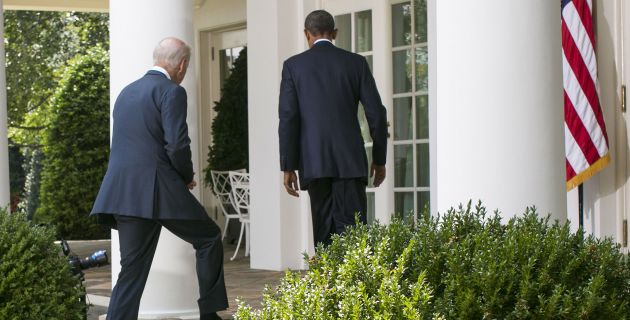
Obama calls Russian proposal a “potentially positive development.” President Obama said Monday Russia’s proposal that Syria turn its chemical weapons over to international monitors to avoid a US attack was a “potentially positive development” and could be a “significant breakthrough.” He also said, though, that he was skeptical Syria would follow through. In an interview with CBS News, Obama said:
The importance is to make sure that the international community has confidence that these chemical weapons are under control, that they are not being used, that potentially they are removed from Syria and that they are destroyed. And there are a lot of stockpiles inside of Syria, it’s one of the largest in the world. Let’s see if they’re serious. But we have to make sure that we can verify it and enforce it, and if in fact we’re able to achieve that kind of agreement that has Russia’s agreement and the Security Council’s agreement, then my central concern in this whole episode is resolved. It doesn’t resolve the underlying terrible conflict in Syria.
Reid delays Senate test vote. Senate Majority Leader Harry Reid announced Monday that he is delaying a test vote on authorizing US military strikes in Syria while international discussion continues about potential solutions. Reid told the Associated Press that it’s not important to “see how fast we can do this…We have to see how well we can do this.”
Obama embraces UN idea. President Obama believes the United Nations Security Council should take the lead in negotiating a plan for Syria to give up its chemical weapons, an anonymous White House official told the Associated Press on Tuesday morning. Earlier in the day, White House Press Secretary Jay Carney called the Syrian regime’s acceptance of Russia’s proposal that it give up its chemical weapons a “potentially positive development” that was “a clear result of the pressure that’s been put on Syria by the fact that the president has been moving forward.”
Syria says it is ready to hand over its chemical weapons. Syrian foreign minister Walid al-Moallen said Tuesday that the Assad regime is ready to sign on to the chemical weapons ban and place its existing stockpile under international control. In response, Secretary of State John Kerry expressed his hope that Syria would take advantage of this opportunity to make peace, according to the Associated Press.
President Obama makes his case to the nation. In a primetime speech on Tuesday night, President Barack Obama made a forceful case for a possible strike against the regime of Bashar al-Assad. He reiterated the argument that the United States has both a humanitarian obligation to respond to the horrific use of chemical weapons against civilians, and a national security interest in preventing Assad from using such weapons again and signaling to other tyrants that such attacks will not be tolerated. The president tried to deploy both emotion (referring to the dreadful images from the August 21 chemical weapon attack near Damascus) and logic (contending that an assault would lessen the odds of future attacks, limit the possibility that chemical weapons fall into the hands of extremists, and prevent US troops from facing chemical weapons in conflicts down the road). He tried to respond to the main reservations raised by lawmakers and voters. (Should the United States be the world’s policeman? No, but no one else can respond to this particular attack now.) The news of the night was that he asked Congress to put off any vote on a resolution authorizing him to launch a limited strike against Syria so that the United States could pursue the deal proposed by Russia that would place Assad’s chemical weapons under international control. And Obama announced he was sending Kerry to negotiate with the Russian foreign minister. Still, the speech was aimed at bolstering support on Capitol Hill and within the public for military action against Syria, if diplomacy fails. Obama summed up his case:
Our ideals and principles, as well as our national security, are at stake in Syria, along with our leadership of a world where we seek to ensure that the worst weapons will never be used. America is not the world’s policeman. Terrible things happen across the globe, and it is beyond our means to right every wrong. But when, with modest effort and risk, we can stop children from being gassed to death and thereby make our own children safer over the long run, I believe we should act. That’s what makes America different. That’s what makes us exceptional. With humility, but with resolve, let us never lose sight of that essential truth.
There’s no telling whether this speech will win over skeptical citizens and legislators. But with a diplomatic resolution possible—though by no means a given—and a showdown in Congress postponed, perhaps Obama did not have to. –David Corn

